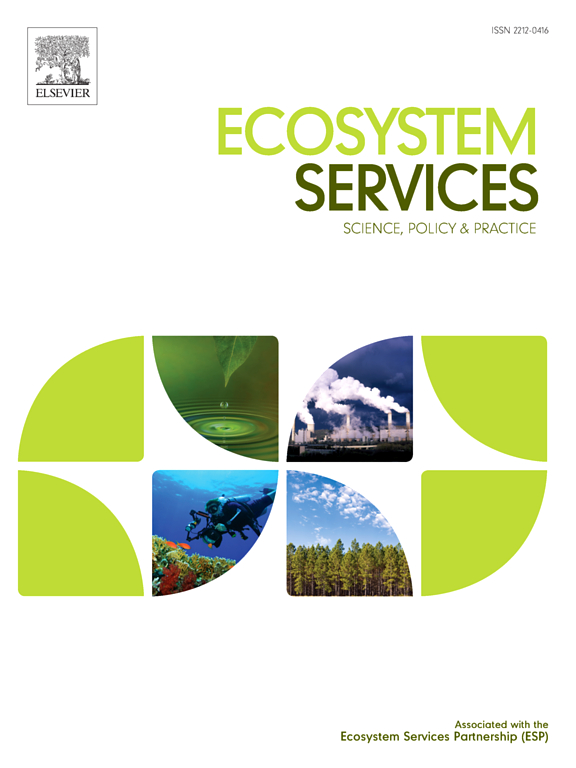Nature-based solutions for watershed management: An investigation on water-related ecosystem services delivery at multiple spatial scales
IF 6.6
2区 环境科学与生态学
Q1 ECOLOGY
引用次数: 0
Abstract
The expansion of urban areas, driven by population growth and economic activities, places significant pressure on water resources, affecting both quality and quantity. Furthermore, climate change alters rainfall patterns, leading to more frequent and intense events in many cities. This increases the risk of flooding and water pollution, as drainage systems become more frequently exceeded and impervious surfaces rise.
In this context, Nature-Based Solutions (NBS) offer a way to address urban and societal challenges by mimicking natural processes like infiltration and evapotranspiration, thereby promoting the Ecosystem Services (ES) delivery. This research aims to identify the most effective NBS combination to tackle urban flooding challenges, by assessing the “water flow regulation” and “water quality regulation” ES.
Using hydrological modelling and ES assessments in the Seveso River watershed in Northern Italy, the study found that combining NBS for stormwater management with river restoration significantly reduces peak flow rates, discharged volumes, flooded areas and pollution, also improving the river ecological quality. Different NBS scenarios were evaluated across various spatial scales, demonstrating their ability to enhance ES. The results highlight NBS multifunctionality, not only improving “water flow regulation” and “water quality regulation” services, but also providing multiple co-benefits.
基于自然的流域管理解决方案:多空间尺度下与水相关的生态系统服务提供研究
在人口增长和经济活动的推动下,城市地区不断扩大,给水资源带来了巨大压力,影响了水质和水量。此外,气候变化改变了降雨模式,导致许多城市的降雨更加频繁和剧烈。在这种情况下,基于自然的解决方案(NBS)通过模仿渗透和蒸散等自然过程,提供了一种应对城市和社会挑战的方法,从而促进生态系统服务(ES)的提供。这项研究旨在通过评估 "水流调节 "和 "水质调节 "生态系统服务,确定应对城市洪水挑战的最有效的 NBS 组合。通过在意大利北部塞韦索河流域进行水文建模和生态系统服务评估,研究发现,将 NBS 用于雨水管理与河流恢复相结合,可显著降低峰值流速、排水量、淹没面积和污染,同时改善河流生态质量。在不同的空间尺度上对不同的 NBS 方案进行了评估,证明了它们提高 ES 的能力。研究结果凸显了 NBS 的多功能性,不仅改善了 "水流调节 "和 "水质调节 "服务,还提供了多重共同效益。
本文章由计算机程序翻译,如有差异,请以英文原文为准。
求助全文
约1分钟内获得全文
求助全文
来源期刊

Ecosystem Services
ECOLOGYENVIRONMENTAL SCIENCES&-ENVIRONMENTAL SCIENCES
CiteScore
14.90
自引率
7.90%
发文量
109
期刊介绍:
Ecosystem Services is an international, interdisciplinary journal that is associated with the Ecosystem Services Partnership (ESP). The journal is dedicated to exploring the science, policy, and practice related to ecosystem services, which are the various ways in which ecosystems contribute to human well-being, both directly and indirectly.
Ecosystem Services contributes to the broader goal of ensuring that the benefits of ecosystems are recognized, valued, and sustainably managed for the well-being of current and future generations. The journal serves as a platform for scholars, practitioners, policymakers, and other stakeholders to share their findings and insights, fostering collaboration and innovation in the field of ecosystem services.
 求助内容:
求助内容: 应助结果提醒方式:
应助结果提醒方式:


